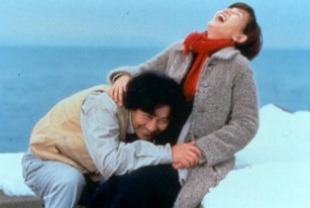In Tokyo, Yosuke (Koji Yakusho) has lost his job and left his wife. He befriends Taro (Kazuo Kitamura), a free-spirited intellectual who lives in a book-lined hut on a riverbank. Just before the old man dies, he tells Yosuke that a long time ago he stole a golden Buddha from a temple in Kyoto and hid it in a house by a red bridge on the Noto Peninsula. With nothing else to do, the worn-out middle-aged man decides to go off in search of the lost treasure.
Arriving in the town, Yosuke finds the house by the red bridge and learns that Saeko (Misa Shimizu) lives there with her grandmother. After watching her steal some cheese in a supermarket, he picks up one of her earrings in a puddle of water on the floor where she stood. He returns it to her, and they make love. He is astonished to see her gush gallons of water that runs through the house and down to the river outside. It seems that this physical disorder compels her to kleptomania or lust.
Yosuke decides to stay in town and work as a fisherman. He soon finds himself mesmerized by Saeko and her mysterious water flow whenever she reaches orgasm. Other men in the community are frightened of her because one of her former lovers drowned. They imply that she drained him of his vitality. But Yosuke believes that he can help her overcome her affliction. Whenever she fills up, Saeko uses the glare of a mirror to get his attention, and he drops everything and runs to the house to have sex with her. In one quirky sequence, he rushes by an African marathoner who is training for the Olympics.
Shohei Imamura, the director of this wonderfully idiosyncratic Japanese film, has stated that the twenty-first century will not only be the era of science and technology but the era of women. One of the best films in his long career was The Ballad of Narayama about a strong-souled elderly woman. This tale, which abounds with water imagery, has its own special brand of magical realism. The water that Saeko secretes when she experiences physical pleasure makes flowers bloom out of season and, much to the delight of locals, draws in large fish from the sea. She is the personification of fertility; she could also be seen as Mother Nature.
Yosuke gives up his search for the gold Buddha and even hurls his cell phone into the sea as a defining moment in the transformation that has come over him. In the end, this unusual film celebrates the healing power of women and the capacity of love to turn everything around.
